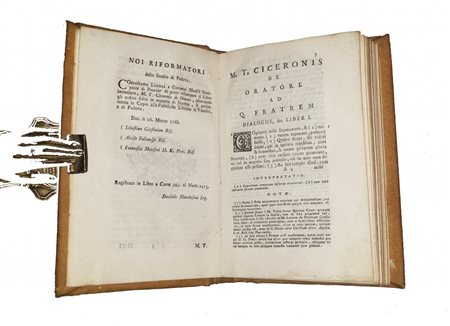 Bibliopathos - Via Enrico Toti 1, 37129 Verona
Bibliopathos - Via Enrico Toti 1, 37129 Verona
Medieval Notary Manuscripts & Law Books Sessione Unica - dal lotto 1 al lotto 280
Monday 28 December 2015 hours 17:00 (UTC +01:00)
THE ART OF SPEAKING AND THE PERFECT HARANGUECicero, Marcus Tullius. M. Tullii...
THE ART OF SPEAKING AND THE PERFECT HARANGUE
Cicero, Marcus Tullius. M. Tullii Ciceronis De Oratore ad Q. fratrem libri III cum interpretatione ac notis Jacobi Proust e Secietate Jesu. Editio altera Patavina aliquibus locis castigata & aucta.Patavii (Padua): typis Seminarii ... apud Joannem Manfrè(IS), Seminario [et al.] 1768.
Large 8vo, contemporary paperboards, pp. 407, [1].
Woodcut head-letters, woodcut head and tail pieces.
Beautiful Padua edition of Cicero's De Oratore, a treatise on the art of the perfect speaker.
De Oratore («On the Orator»; not to be confused with «Orator») is a dialogue written by Cicero in 55 BC.
Amidst the moral and political decadence of the state, Cicero wrote De Oratore to describe the ideal orator and imagine him as a moral guide of the state. He did not intend De Oratore as merely a treatise on rhetoric, but went beyond mere technique to make several references to philosophical principles. Cicero understood that the power of persuasion—the ability to verbally manipulate opinion in crucial political decisions—was a key issue. The power of words in the hands of a man without scruples or principles would endanger the whole community.
As a consequence, moral principles can be taken either by the examples of noble men of the past or by the great Greek philosophers, who provided ethical ways to be followed in their teaching and their works. The perfect orator shall be not merely a skilled speaker without moral principles, but both an expert of rhetorical technique and a man of wide knowledge in law, history, and ethical principles. De Oratore is an exposition of issues, techniques, and divisions in rhetoric; it is also a parade of examples for several of them and it makes continuous references to philosophical concepts to be merged for a perfect result.
Marcus Tullius Cicero (106 BC – 43 BC) was a Roman philosopher, politician, lawyer, orator, political theorist, consul and constitutionalist. He came from a wealthy municipal family of the Roman equestrian order, and is widely considered one of Rome's greatest orators and prose stylists and the most famous lawyer of every time.
References: OCLC 97688036







